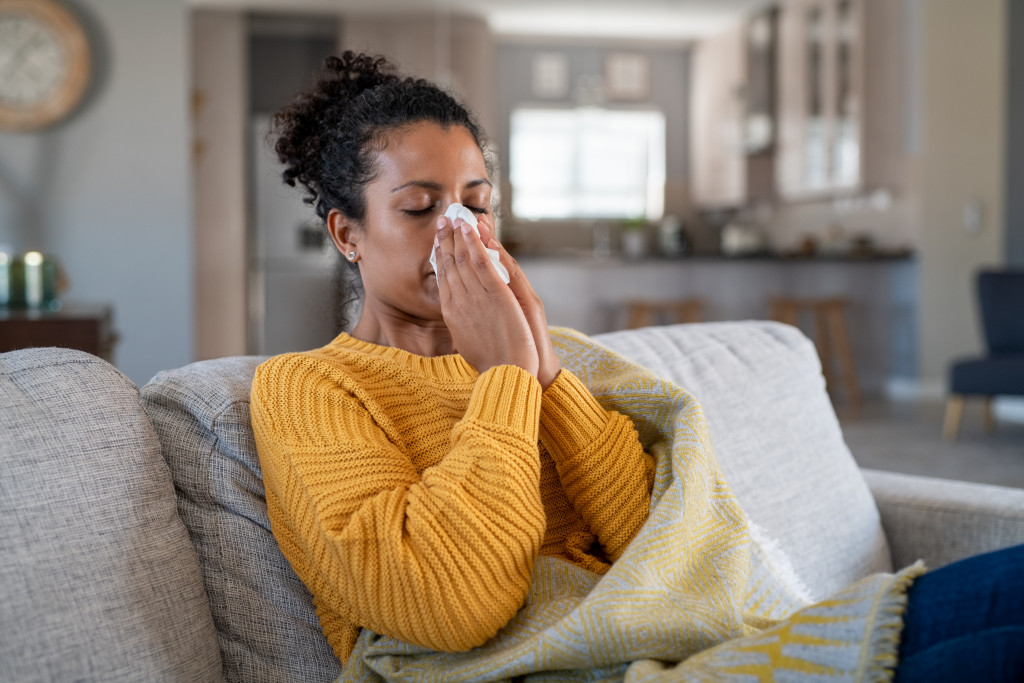Disclaimer: This website provides health information for educational purposes only and is not a substitute for professional medical advice, diagnosis, or treatment. Always seek the guidance of a qualified healthcare provider with any questions you may have.
- Air purifiers and proper ventilation can significantly improve indoor air quality by filtering out allergens.
- Pets can be major allergen sources; frequent grooming, keeping them out of bedrooms, and regularly washing their belongings can help.
- Removing carpets and replacing them with hard flooring can prevent the accumulation of dust mites and pet dander.
- Regular and thorough cleaning of your home, including dusting and vacuuming, can minimize the presence of allergens.
- Maintaining a clutter-free home and having dedicated areas for outdoor items can prevent tracking in outdoor allergens.
Allergies can greatly hinder people’s daily lives, especially when you spend most of your time indoors. It is common for allergies to be triggered by irritants that float in the air, such as dust, pollen, and pet dander. As a homeowner, you can take specific steps to minimize the impact of these allergens in your house. This blog post aims to provide tips on designing a home conducive to better health.
Invest in an air purifier:
Investing in an air purifier is one of the easiest ways to improve indoor air quality. These appliances are designed to filter out pollutants and allergens, leaving you with cleaner air to breathe. Be sure to choose a purifier with a HEPA filter that can catch even the smallest particles. You can also opt for an air purifier with a built-in ionizer, which helps to remove airborne allergens and neutralize odors. If you have pets, look for purifiers designed to remove pet dander and hair.
Ensure good ventilation:
Proper ventilation is crucial in maintaining good indoor air quality. Make sure your home has enough fresh air coming in and circulating throughout the house. Here are some ways to do this:
Roof lights:
You can introduce both natural light and ventilation with a flat roof light that opens up, giving you easy access to fresh air. They also add interest to your home’s interior and create a sense of space. Many modern roof light designs also come equipped with rain sensors to close automatically in case of bad weather.

Ceiling fans:
Ceiling fans effectively circulate and stir up stale, stagnant air. When shopping for ceiling fans, look for those with reversible direction settings. This allows you to use the fan not only in summer but also in winter by pushing warm air down from the ceiling.
Windows and doors:
Open windows and doors regularly to allow fresh air to come into your home and circulate. If possible, install screens on windows and doors to keep out insects and pollen while still letting fresh air in. You can also use window and door draft stoppers to prevent air from escaping.
Beware of pets:
Your furry friends may be a significant source of allergens, so taking extra precautions is essential if you have pets at home. Even scaly pets like reptiles can trigger allergies through their droppings and dander. Here are some tips to minimize allergens from pets:
Groom regularly:
Regularly groom your pets to reduce the amount of hair and dander they shed. Brushing them outside or in a designated area can also prevent these allergens from spreading throughout the house.

Keep them out of bedrooms:
If possible, keep pets out of bedrooms to minimize exposure to allergens while you sleep. Consider using a high-quality air purifier with a HEPA filter in your bedroom to keep the air clean and free from allergens.
Wash pet bedding often:
Wash your pet’s bedding, blankets, and other items they regularly come into contact with. This will help remove any accumulated hair or dander that can trigger allergies.
Remove carpeting:
Carpeting can be a breeding ground for allergens, such as dust mites and pet dander. If possible, remove carpeting in your home and replace it with hard flooring, such as tile or hardwood. If you prefer the look of carpeting, opt for area rugs that can be easily cleaned or replaced. You can also treat carpets with allergen-reducing sprays or powders.
Keep your home clean:
Regular cleaning is essential for minimizing allergens in your home. Be sure to dust and vacuum frequently, and use cleaning products free of harsh chemicals. It is also a good idea to wash bedding and upholstery regularly to rid them of any allergens that may be present. Most importantly, try to keep your home clutter-free, as clutter can collect dust and other allergens. Many people also find it helpful to have a designated area where shoes and coats can be taken off when entering the home, preventing outside allergens from being tracked in.
Making your home conducive to better health is a matter of taking small, manageable steps. Investing in an air purifier, ensuring proper ventilation, taking precautions with pets, removing carpeting, and keeping your home clean can significantly reduce the impact of allergens on your daily life. Remember, a healthier home means a healthier you. With these tips, you can create a comfortable and allergy-friendly living space for you and your family.




